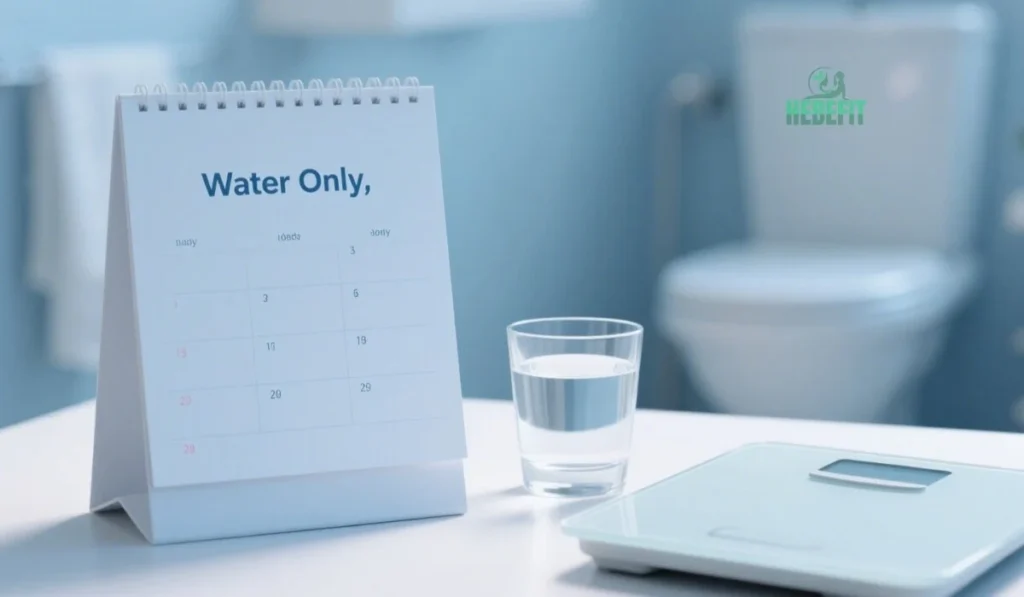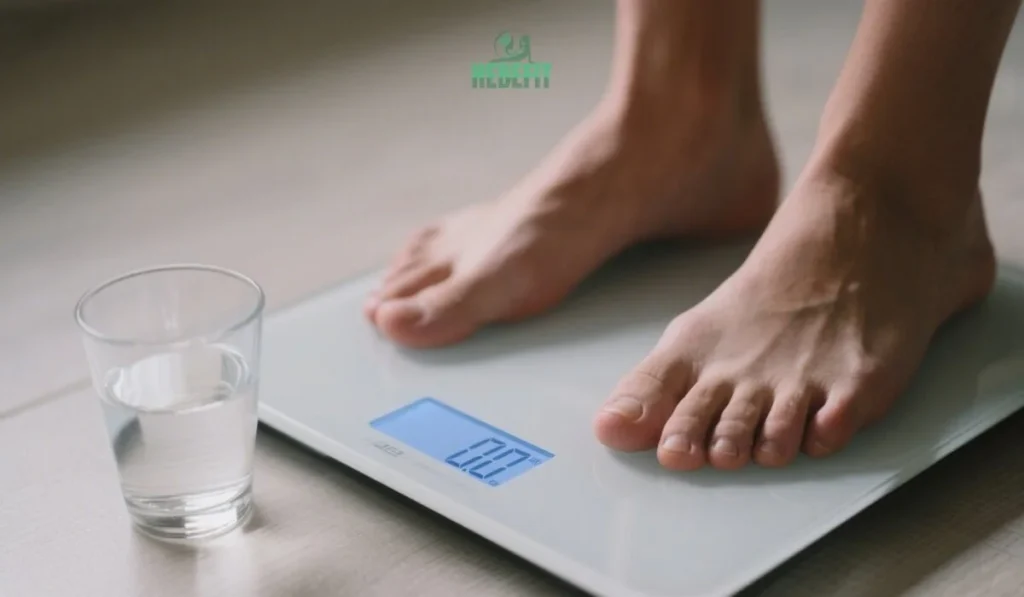Unveiling the Truth: How Much Weight Can You Really Lose on a 3-Day Water Fast?
The allure of rapid weight loss can be strong, often leading people to explore various methods, some more extreme than others. You might be diligently working on your Forearm Workouts, aiming for strength and definition and simultaneously wondering about quicker ways to shed pounds. While consistent effort in exercises like Forearm Workouts builds sustainable results, the idea of a 3-day water fast often pops up in discussions about rapid weight changes. Many individuals, perhaps even those dedicated to their Forearm Workouts, are curious about the immediate impact of such a fast. This post aims to demystify the 3-day water fast, exploring realistic weight loss expectations, the science behind it and crucial safety considerations. It’s not as simple as just skipping meals; there’s much more to understand before even considering such a path.

What Exactly IS a 3-Day Water Fast? Understanding the Basics
Before we dive into potential weight loss, it’s essential to understand what a 3-day water fast entails. As the name suggests, it involves abstaining from all food and caloric beverages for a continuous period of 72 hours, consuming only water. Some interpretations might allow for unsweetened black coffee or tea, but a “true” or “strict” water fast typically means just water.
This is not a casual undertaking. It’s a significant physiological stressor on the body and should not be confused with intermittent fasting schedules like 16/8 or 5:2, which involve much shorter fasting windows and regular eating periods.
Key Characteristics of a Water Fast:
- Duration: Specifically, 72 hours for a “3-day” fast.
- Intake: Only plain water. No food, juices, sodas, milk or caloric sweeteners. Some purists even avoid mineral water with added electrolytes during the fast itself, though this can be risky.
- Purpose (Commonly Claimed): Often undertaken for rapid weight loss, “detoxification” (a controversial concept), religious or spiritual reasons or to potentially trigger autophagy (the body’s cellular cleanup process).
- Crucial Caveat: It is highly recommended to consult with a healthcare professional before attempting a water fast, especially one lasting three days. It’s not suitable for everyone and can carry significant risks.
This is fundamentally different from a caloric restriction diet where you eat less but still consume nutrients. A water fast means zero caloric and minimal nutrient intake for the duration.
The Science: Why Does Weight Loss Occur During a Water Fast?
When you stop consuming calories, your body has to turn to its stored reserves for energy. This process unfolds in stages:
- Glycogen Depletion (First 24-48 hours): Your body first uses up its stored glucose, primarily in the form of glycogen, which is found in the liver and muscles. Glycogen is bound with water (approximately 3-4 grams of water per gram of glycogen). As you deplete glycogen, you lose this associated water weight. This accounts for a significant portion of the initial rapid weight loss.
- Ketosis: Once glycogen stores are significantly diminished, your body switches to burning fat for fuel. This metabolic state is called ketosis, where the liver breaks down fats into ketone bodies, which can be used as an energy source by the brain and other tissues. This is when true fat loss begins to occur more substantially.
- Metabolic Adaptations: Your body also undergoes various hormonal changes. Insulin levels drop significantly (as there’s no carbohydrate intake), which facilitates fat breakdown. Glucagon, growth hormone, and norepinephrine levels may rise, which also play roles in mobilizing fat stores.
Water Weight vs. Actual Fat Loss
It’s critical to differentiate between overall weight lost on the scale and actual fat loss.
- Water Weight: A substantial portion of the weight lost during the first few days of any drastic dietary change, especially a water fast, is water. This comes from depleted glycogen stores and a reduction in overall inflammation and fluid retention that can occur when processed foods and high sodium are eliminated.
- Fat Loss: True fat loss happens when your body metabolizes stored adipose tissue for energy. This process is slower than water weight loss but is the goal for sustainable weight management.
- Muscle Loss: There’s also a risk of some muscle protein breakdown, especially if the fast is prolonged or if an individual isn’t adequately prepared or has low body fat reserves. The body tries to preserve muscle, but some loss can occur.
During a 3-day fast, you will lose a combination of water, some fat, and potentially a small amount of muscle mass. The exact proportions vary.
The Big Question: How Much Weight Will I Realistically Lose on a 3-Day Water Fast?
This is the number everyone wants, but it’s not a single, fixed figure. Weight loss during a 3-day water fast can vary significantly, typically ranging from 3 to 10 pounds (approximately 1.4 to 4.5 kg), but this is highly individual.
It’s crucial to understand that a large percentage of this initial loss is water weight.
Factors Influencing Weight Loss on a 3-Day Fast:
Several factors will determine how much weight you specifically might lose:
- Starting Body Weight and Composition: Individuals with a higher starting weight and more body fat percentage tend to lose more weight, including more water weight, initially.
- Metabolism: Your basal metabolic rate (BMR) plays a role. Those with a naturally faster metabolism might burn through glycogen and tap into fat stores a bit quicker.
- Activity Level During the Fast: While strenuous exercise is generally not recommended (and can be dangerous) during a water fast, light activity versus being completely sedentary can influence calorie expenditure. However, energy levels will likely be too low for much activity.
- Previous Diet: If you were consuming a diet high in carbohydrates and sodium before the fast, you’ll likely experience a more dramatic initial drop in water weight as glycogen depletes and sodium-induced water retention decreases.
- Hydration Levels Pre-Fast: If you were already well-hydrated, the water weight component might be slightly different than if you were chronically dehydrated.
- Genetics: Genetic factors can influence metabolic responses to fasting.
- Gender: Men sometimes lose weight, particularly water weight, a bit faster initially due to generally higher muscle mass (which stores more glycogen).
Estimated Weight Loss Components on a 3-Day Water Fast (Illustrative)
| Component | Estimated % of Total Loss (Highly Variable) | Notes |
| Water Weight | 50-70% | Primarily from glycogen depletion and reduced sodium intake. |
| Fat Loss | 20-40% | Begins more significantly after glycogen is depleted (day 2-3). |
| Muscle Mass Loss | 5-10% (or more in some cases) | The body tries to preserve muscle, but some catabolism can occur. |
| Gut Content | Variable | Emptying of the digestive tract contributes to initial scale changes. |
Disclaimer: These percentages are general estimates and can vary wildly between individuals.

What Happens After the Fast? The Rebound Effect
This is a critical point many overlooks. A significant portion of the weight lost during a 3-day water fast is often regained once normal eating resumes.
- Glycogen Repletion: As you reintroduce carbohydrates, your body will replenish its glycogen stores, and with it, the associated water (remember, 1g glycogen holds ~3-4g water). This can cause a rapid increase on the scale.
- Sodium Intake: Resuming normal food intake, which contains sodium, will also lead to some water retention.
- Gut Contents: Your digestive system will have food in it again.
Therefore, if you lose, say, 7 pounds in 3 days, you might regain 2-4 pounds (or more) of water weight within a few days of refeeding. The net fat loss will be considerably less than the total weight dropped on the scale during the fast itself. A realistic sustained fat loss from a 3-day fast might be in the range of 1-3 pounds of actual fat, depending on the factors mentioned above.
Beyond Weight Loss: Other Potential (and Cautiously Viewed) Effects
While weight loss is a primary motivator, proponents of water fasting sometimes cite other potential benefits. It’s important to approach these with a critical eye, as much of the research is ongoing, preliminary or done on animals.
- Autophagy: This is a cellular “clean-up” process where the body removes damaged cells and regenerates new ones. Fasting is a known trigger for autophagy. The extent and clinical significance in humans from a short 3-day fast are still being researched.
- Insulin Sensitivity: Fasting can significantly reduce insulin levels and improve insulin sensitivity, which is beneficial for metabolic health.
- Reduced Inflammation: Some studies suggest fasting can lower markers of inflammation.
- Mental Clarity (for some): After initial hunger pangs and potential “brain fog,” some individuals report a sense of mental clarity and focus during later stages of a fast, possibly related to ketone production. Others experience the opposite.
It’s crucial to weigh these potential upsides against the very real risks.
Understanding the Risks and Why Caution is Paramount
A 3-day water fast is not without significant risks, especially if undertaken without medical guidance or by individuals with pre-existing health conditions.
Potential Risks and Side Effects:
- Dehydration: If water intake isn’t sufficient, or if electrolytes are severely imbalanced.
- Electrolyte Imbalance: Sodium, potassium, magnesium and calcium are vital. Depleting them can lead to serious issues like heart arrhythmias, muscle weakness and confusion. This is a major concern.
- Hypoglycemia: Low blood sugar, especially risky for diabetics but can affect anyone, leading to dizziness, weakness, fainting.
- Orthostatic Hypotension: A sudden drop in blood pressure when standing up, causing dizziness or fainting.
- Nutrient Deficiencies: While a 3-day fast won’t cause severe chronic deficiencies, it provides no vitamins, minerals, or protein.
- Refeeding Syndrome: A potentially life-threatening condition that can occur when reintroducing food too quickly after a period of starvation, especially in malnourished individuals. It involves severe shifts in fluids and electrolytes. This is why breaking a fast correctly is critical.
- Headaches, Dizziness, Fatigue, Nausea: Common side effects due to metabolic shifts and lack of calories.
- Muscle Loss: As mentioned, some muscle breakdown can occur.
- Exacerbation of Underlying Conditions: Can be dangerous for those with heart disease, kidney disease, liver disease, eating disorders, gout or those who are pregnant or breastfeeding.
- Medication Interactions: Fasting can affect how medications are absorbed and metabolized.
Who Should AVOID a 3-Day Water Fast (Consult Your Doctor!)
| Condition/Group | Reason for Caution |
| Diabetes (Type 1 or 2) | High risk of severe hypoglycemia or hyperglycemia; medication adjustments crucial. |
| History of Eating Disorders | Can trigger unhealthy behaviors and thoughts. |
| Pregnant or Breastfeeding Women | Nutritional needs are significantly increased; fasting is harmful. |
| Kidney Disease | Impaired ability to regulate fluids and electrolytes. |
| Liver Disease | Impaired metabolic functions. |
| Heart Conditions | Risk of arrhythmias due to electrolyte shifts. |
| Low Blood Pressure (Hypotension) | Can worsen symptoms. |
| Individuals on Certain Meds | E.g., diuretics, blood pressure meds, diabetes meds – interactions can be dangerous. |
| Underweight Individuals | Lack of reserves can make fasting particularly taxing and risky. |
| Gout | Fasting can increase uric acid levels and trigger gout attacks. |
This list is not exhaustive. ALWAYS consult a doctor.
Approaching a 3-Day Water Fast (If Deemed Appropriate with Medical Supervision)
If, after thorough research and consultation with your doctor, you decide a 3-day water fast is something you wish to consider, here’s a general approach to safety:
Preparation (The Week Before)
- Gradually Reduce Caloric Intake: Don’t go from feasting to fasting. Taper down food intake, especially processed foods, sugar, and caffeine, to minimize withdrawal symptoms.
- Focus on Whole Foods: Eat nutrient-dense whole foods to ensure your body has some reserves.
- Hydrate Well: Increase water intake.
- Mentally Prepare: Understand what to expect. Clear your schedule of strenuous activities.
- Electrolyte Awareness: Some protocols suggest supplementing with electrolytes (sodium, potassium, magnesium) before and after the fast, but rarely during a strict water fast unless medically advised. Discuss this with your doctor.
During the Fast (72 Hours)
- Water Only: Drink plenty of plain water throughout the day (e.g., 2-3 liters, or as advised).
- Rest: Listen to your body. Expect lower energy levels. Avoid strenuous exercise. Light stretching or very gentle walking might be okay for some, but rest is key.
- Monitor Symptoms: Pay close attention to how you feel. If you experience severe dizziness, heart palpitations, confusion, or extreme weakness, break the fast immediately and seek medical attention if necessary.
- Avoid Strenuous Mental Tasks if Possible: Concentration might be impaired for some.
Breaking the Fast (Critically Important!)
This is arguably the most crucial phase for safety, especially after 3 days. Introduce food slowly and gently to avoid refeeding syndrome and digestive distress.
- Day 1 Post-Fast:
- Start Small & Gentle: Begin with very small portions of easily digestible foods.
- Examples: Bone broth, a few Spoonfuls of plain yogurt (if dairy is tolerated), a small piece of soft fruit like watermelon or a few berries, steamed non-starchy vegetables.
- Avoid: Heavy, greasy, sugary, or highly processed foods. Large meals.
- Day 2 Post-Fast:
- Gradually increase portion sizes.
- Continue with easily digestible foods: lean protein (e.g., a small piece of fish or chicken), more steamed vegetables, small amounts of healthy fats (avocado).
- Day 3 Post-Fast & Beyond:
- Slowly return to a normal, balanced diet, focusing on whole, unprocessed foods.
- Pay attention to your body’s signals of hunger and fullness.

What to Expect: A Possible Day-by-Day Experience (General Guide)
Experiences vary, but here’s a general outline:
- Day 1:
- Morning/Afternoon: Hunger pangs are common, especially if you’re used to regular meals. You might feel relatively normal otherwise.
- Evening: Hunger may intensify. Some may experience mild headaches or irritability as caffeine/sugar withdrawal kicks in. Glycogen stores start to deplete.
- Day 2:
- Morning: Often reported as the toughest day. Hunger can be intense. Fatigue, brain fog and weakness are common. Headaches may persist.
- Afternoon/Evening: For some, hunger may start to subside as the body shifts more towards ketosis. Others continue to feel very weak. Electrolyte balance becomes more critical.
- Day 3:
- Morning: Some individuals report a decrease in hunger and even a sense of mental clarity or mild euphoria (often attributed to ketones). Others still feel weak and fatigued.
- Afternoon/Evening: You might be anticipating the end of the fast. Energy levels are typically still low. Focus on hydration and rest.
Remember, these are generalizations. Your experience could be very different. If you feel unwell, stop.
Is a 3-Day Water Fast a Sustainable Weight Loss Strategy?
For the vast majority of people, the answer is no.
While a 3-day water fast can lead to a quick drop on the scale, most of this is water weight that will be regained. True, sustainable fat loss requires consistent, long-term changes in diet and lifestyle.
- Not a Long-Term Fix: Fasting for 3 days doesn’t teach healthy eating habits or address the root causes of weight gain.
- Risk of Yo-Yo Dieting: Repeated cycles of extreme restriction followed by normal (or over-) eating can be detrimental to metabolism and mental health.
- Focus on Sustainability: Building healthy habits like regular exercise (including those Forearm Workouts!), a balanced diet rich in whole foods, stress management, and adequate sleep are far more effective for long-term weight management and overall health.
A 3-day water fast might be seen by some as a “reset” or a way to kickstart a healthier lifestyle, but it should not be relied upon as a primary method for ongoing weight control. The habits you build after the fast are what truly matter.
Final Thoughts: A Balanced Perspective is Key
The prospect of losing several pounds in just three days via a water fast is undeniably tempting for many. However, it’s crucial to approach this topic with a well-informed and cautious mindset. The weight lost is a mix of water, fat, and potentially some muscle, with a significant portion of water weight likely to return upon refeeding.
The most important takeaways are:
- Consult Your Doctor: This cannot be stressed enough. A 3-day water fast is not for everyone and carries risks.
- Understand What You’re Losing: A lot of it is water. Manage expectations for sustained fat loss.
- Safety First: If you proceed (with medical approval), prepare properly, listen to your body during the fast, and break the fast very carefully.
- Not a Magic Bullet: It’s not a sustainable long-term weight loss solution. Focus on building healthy, lasting habits.
While a 3-day water fast can result in a temporary drop on the scale, its role in a healthy, sustainable weight management plan is limited and often overshadowed by its potential risks. Prioritize informed decisions, safety, and long-term well-being over quick, potentially fleeting, results.
FAQs
How much actual fat can I expect to lose in a 3-day water fast?
While total weight loss might be 3-10 pounds, actual fat loss is likely much less, perhaps 1-3 pounds. A significant portion of the initial weight loss is water weight due to glycogen depletion. The exact amount of fat loss depends on individual factors like starting weight, metabolism, and body composition.
Is it safe to exercise during a 3-day water fast?
Strenuous exercise is generally NOT recommended and can be dangerous during a 3-day water fast due to low energy levels and the risk of dehydration or electrolyte imbalance. Very light activity like gentle stretching or short, slow walks might be tolerable for some, but rest should be prioritized. Always listen to your body and consult your doctor.
What can I drink during a 3-day water fast?
Strictly speaking, a water fast means consuming only plain water. Some people include unsweetened black coffee or tea, but this technically deviates from a pure water fast. No caloric beverages, juices, sodas, or sweeteners should be consumed.
How do I break a 3-day water fast safely?
Break the fast very slowly and gently to avoid refeeding syndrome and digestive upset. Start with small portions of easily digestible foods like bone broth, a small piece of soft fruit (e.g., watermelon), or a few Spoonfuls of plain yogurt on the first day. Gradually reintroduce other whole foods over the next 2-3 days, avoiding heavy, processed or sugary items initially.
Will I lose muscle during a 3-day water fast?
There is a risk of some muscle loss, though the body tries to preserve muscle protein. The extent of muscle loss can depend on factors like your protein intake before the fast, your body composition, and the duration of the fast. Longer fasts carry a higher risk of muscle catabolism.
Can a 3-day water fast help with ‘detoxification’?
The concept of ‘detoxification’ through fasting is controversial. Your body has its own efficient detoxification organs, primarily the liver and kidneys. While fasting does give your digestive system a rest and can trigger autophagy (cellular cleanup), it’s not a substitute for these natural processes. Claims of specific ‘toxin removal’ are often not scientifically substantiated.
What are the most common side effects of a 3-day water fast?
Common side effects include hunger pangs (especially on days 1-2), headaches, dizziness, fatigue, weakness, brain fog, and irritability. More serious risks include dehydration, electrolyte imbalances, and issues for individuals with pre-existing health conditions. It’s crucial to monitor symptoms and stop if you feel significantly unwell.
How often can someone do a 3-day water fast?
There is no universally agreed-upon safe frequency. Repeatedly doing 3-day water fasts is generally not recommended as a routine weight loss strategy and could carry risks. Any consideration of repeated fasting should be thoroughly discussed with a healthcare professional who understands your individual health status.











This post is jam-packed with valuable information and I appreciate how well-organized and easy to follow it is Great job!
Thanks, Ava Duarte, for your comments.
I have recommended your blog to all of my friends and family Your words have the power to change lives and I want others to experience that as well
Thanks for your best comments sir.
This blog is like a breath of fresh air in the midst of all the negativity on the internet I’m grateful to have stumbled upon it
Thanks for your best comments, sir.